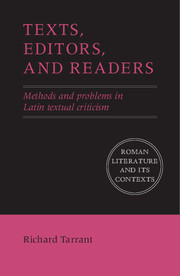Book contents
- Frontmatter
- Dedication
- Contents
- Preface
- Introduction
- 1 Textual criticism in a post-heroic age
- 2 The rhetoric of textual criticism/textual criticism as rhetoric
- 3 Establishing the text 1: recension
- 4 Establishing the text 2: conjecture
- 5 Establishing the text 3: interpolation, collaboration, and intertextuality
- 6 Textual criticism and literary criticism: the case of Propertius
- 7 Presenting the text: the critical edition and its discontents
- 8 The future: problems and prospects
- Appendix Reading a critical apparatus
- Bibliography
- General index
- Index of passages discussed
- Index of scholars
7 - Presenting the text: the critical edition and its discontents
Published online by Cambridge University Press: 05 March 2016
- Frontmatter
- Dedication
- Contents
- Preface
- Introduction
- 1 Textual criticism in a post-heroic age
- 2 The rhetoric of textual criticism/textual criticism as rhetoric
- 3 Establishing the text 1: recension
- 4 Establishing the text 2: conjecture
- 5 Establishing the text 3: interpolation, collaboration, and intertextuality
- 6 Textual criticism and literary criticism: the case of Propertius
- 7 Presenting the text: the critical edition and its discontents
- 8 The future: problems and prospects
- Appendix Reading a critical apparatus
- Bibliography
- General index
- Index of passages discussed
- Index of scholars
Summary
Every scholarly edition has to be understood as an embodied argument about the textual transmission. It asks for engagement as an interpretation of the evidence by opening up for inspection the instabilities of composition and revision recorded in the textual apparatus. At the same time, it closes them down in the clear reading text. It fixes a text at the same time as its explanatory apparatus opens it out into the discourses of its day. Editions can and need to be read with and against the grain.
(Eggert (2009), 177)In his introduction to Friedrich Leo's Kleine Schriften, Eduard Fraenkel recalled one of his first encounters with the scholar who would become his mentor: ‘soon after my arrival <in Göttingen> Leo invited me to lunch on a Sunday. After lunch, we went into his lovely garden and he inquired in a friendly way about my work. At the time, I had read most of Aristophanes and began to enthuse about him to Leo, going on at length about the magic of the poetry, the beauty of the choral songs, and heaven knows what else. Leo let me declaim without interruption, perhaps for ten minutes, with no hint of impatience or disapproval. When I had finished, he asked ‘exactly what edition are you reading Aristophanes in?’ I thought to myself ‘was he even listening to me? What has that question got to do with what I was telling him?’ After a moment's ill-tempered delay, I answered ‘in the Teubner edition.’ He replied ‘oh, you read Aristophanes without a critical apparatus.’ He said it absolutely calmly, with no harshness and no trace of mockery, just honestly amazed that a tolerably intelligent young man could do such a thing. I looked down at the grass and had a single overwhelming sensation: νῦν μοι χάνοι εὐρεῖα χθών [‘now let the broad earth gape open for me’= Iliad 4.182, 8.150, with νῦν substituted for τότε]. Later it seemed to me as though in that moment I had grasped the meaning of proper philological study.
Information
- Type
- Chapter
- Information
- Texts, Editors, and ReadersMethods and Problems in Latin Textual Criticism, pp. 124 - 144Publisher: Cambridge University PressPrint publication year: 2016
